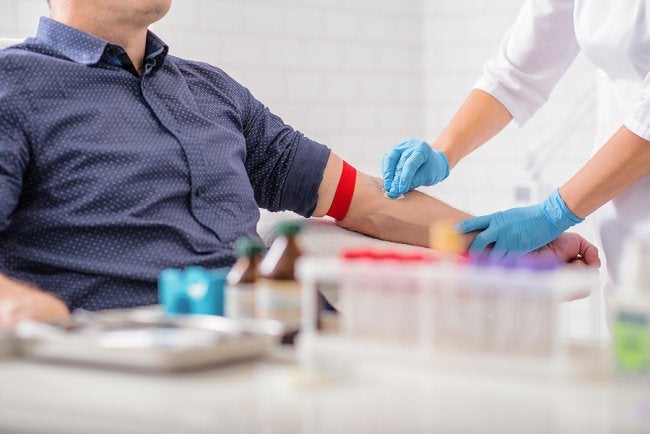-
Advice for Discussing Sexual Health Issues with Your Partner

If you or your partner is experiencing sexual health issues, such as erectile dysfunction or low libido, communication is an essential part of overcoming them. It’s not always easy to begin a conversation about sexual health, but it’s important for your relationship to have an open and ongoing dialogue with your partner about issues you may both be experiencing. These tips for discussing sexual health can help you start the conversation.
Pick the Right Time and Place
Because sexual health can be a sensitive topic, choose the time and place of your conversation wisely. Pick a time when you and your partner can sit together without distractions and aren’t rushed. Have your conversation in a private place, where both of you can feel comfortable talking about the issues openly and honestly. Avoid starting the conversation before work, when you have someplace to be, or otherwise have obligations that could interfere with your ability to talk for as long as you need to.
Be Direct
Be direct with your partner about your concerns about your sexual health and how it is or could affect your relationship. If have been diagnosed with a problem by your urologist, it can helpful to explain your condition and even give your partner materials your doctor may have provided to help you understand it. If your partner is the one experiencing the issue, ask any questions you may have and offer to research the answers together. The more informed both of you are about the issues, the better equipped you will be to face them together.
Talk About Treatments
Help your partner understand the treatment options available for the sexual health issue you are experiencing or ask questions about the treatments he or she is considering. In many cases, partner involvement in treatments can be helpful. In all cases, having the support of your partner when dealing with sexual health issues is important.
Your urologist at Urology Associates, P.C. can help you prepare for your conversation about sexual health by equipping you with the information you need. If you are experiencing sexual dysfunction in Nashville, make an appointment with a urologist today by calling (855) 901-1338.
-
What Are the Symptoms, Causes, and Treatments of Vaginal Atrophy?

Atrophic vaginitis, or vaginal atrophy , is a condition that urologists most often diagnose in women who are already in menopause, but it may also occur at other stages of a woman’s life. Vaginal atrophy is characterized by the thinning and inflammation of the tissues in the vaginal wall, which can cause painful symptoms and sexual dysfunction. Although these issues can be distressing, women should be aware that effective medical treatments are available.
Signs and Symptoms
Vaginal atrophy is a common cause of vaginal dryness, burning, itching, and unusual discharge. Many women also experience urinary symptoms, such as having the urgent need to urinate. A burning sensation may occur with urination and women may develop urinary incontinence. A patient’s history may reflect the increased occurrence of urinary tract infections (UTIs). Sexual intercourse can become uncomfortable or painful and some women may notice light bleeding or spotting afterward. As a result of these problems, it’s not unusual for women with vaginal atrophy to experience sexual dysfunction such as the loss of libido and orgasm problems. Marital distress may develop.
Causes and Risk Factors
The underlying cause of vaginal atrophy is a reduction in estrogen levels, which is why the condition most often affects post-menopausal women and those who are in perimenopause. A substantial decline in estrogen levels may also occur as a result of the surgical removal of the ovaries, cancer treatments, or breastfeeding. Certain factors may increase the risk of vaginal atrophy, including smoking, the lack of sexual activity, and the absence of vaginal births in the patient’s medical history.
Treatment Options
Hormone replacement therapy (HRT) is one option for restoring hormonal balance, but it’s generally advisable to consider other treatments first due to the risks of HRT. Women with mild vaginal atrophy may get good results with vaginal moisturizers and water-based lubricants. Women with more severe symptoms might consider drug-free laser therapy, which can provide relief after the first treatment.
The Women’s Institute for Sexual Health (WISH) at Urology Associates, P.C. connects women to caring urology specialists. We treat every patient with the utmost care to sensitivity and confidentiality. If you are experiencing a sexual health problem and live in Nashville, contact us today at (855) 901-1338.
-
Answering Common Questions About Hematuria

The presence of blood in one’s urine is known as hematuria. Hematuria isn’t a specific medical condition. Rather, it’s a sign of an underlying problem. Although hematuria may be attributed to a benign issue, it might sometimes be caused by a serious medical problem that requires treatment. This is why it’s important to see a urologist promptly, even if you only notice bloody urine once.
What is microscopic hematuria?
Patients who visit a urologist because of hematuria often noticed the visible blood in the urine, but bloody urine isn’t always detectable to the naked eye. Sometimes, the presence of blood in a urine sample is only discovered during other medical exams. When red blood cells in the urine cannot be visibly detected, it is referred to as microscopic hematuria.
Am I at risk of hematuria?
Anyone can experience hematuria, including pediatric patients. Your risk may be elevated if you are a man over the age of 50 or a woman with a urinary tract infection. A family history of kidney problems or a recent infection might also increase your risk. Long-distance runners and other athletes who engage in strenuous exercise may experience hematuria from time to time.
What underlying problems can cause hematuria?
There are many possible causes of hematuria, including relatively harmless issues like strenuous exercise and sexual activity. It may be attributed to a urinary tract infection (UTI), viral infection, or sexually transmitted disease (STD). In men, benign prostatic hyperplasia, also known as an enlarged prostate, can be the culprit. Some of the more serious causes of bloody urine include kidney, ureter, and bladder stones, kidney diseases, sickle cell anemia, and tumors of the bladder, kidneys, prostate, ureter, or urethra. Fortunately, urological cancers are not a common cause . Sometimes, no cause is found. This is known as idiopathic hematuria.
How is hematuria treated?
Your urologist will develop a treatment plan based on his or her findings. Since hematuria is the result of an underlying issue, the treatment will address the cause. If no cause is found, you may be referred for monitoring and follow-up testing.
You’ll find the answers to all of your questions at Urology Associates, P.C. Our urology specialists throughout Tennessee provide cutting-edge treatments for all sorts of urologic conditions—from kidney stones to kidney cancer and many more. Call us at (855) 901-1338 to request a confidential patient evaluation.
-
What Does It Mean to Have an Elevated PSA?

Prostate-specific antigen, or PSA, is a protein that is made by the prostate and present in your blood. Your primary care physician or urologist may perform a PSA test as a routine part of your preventative health care regime. Abnormal levels can indicate a health problem, such as prostate cancer.
If elevated PSA levels are detected during a blood test, your urologist may recommend further prostate cancer screening tests to determine if cancer could be the cause. It is important to note that elevated PSA levels do not necessarily mean that cancer is present, and normal PSA levels do not mean that no cancer exists. It is one tool in the cancer screening process that your urologist can use to detect the disease in early stages, when cancer treatment is most effective.
Your urologist at Urology Associates, P.C. will review all of your lab results with you, so you understand what things like elevated PSA levels mean for your overall health. To schedule an appointment for prostate cancer screenings in Tennessee , please call (888) 329-7700.
Recent Posts
categories
- Uncategorized
- Bladder Cancer
- Women's Sexual Health
- MonaLisa Touch
- Urology
- Urologist
- Erectile Dysfunction
- Kidney Cancer
- Incontinence
- Prostate
- MonaLisa Touch Laser Treatment
- Kidney Stones
- Urinary Tract Infections
- Event
- Sexual Dysfunction
- Testicular Cancer
- Prostate Cancer
- Urology Surgery Center
- urinary incontinence
- vaginismus
- noncoital pain disorder
- Hypoactive Sexual Desire Disorder
- Infographic
- provenge
- Xofigo
- robotic surgery
- hormone replacement
- diabetes
- renal cell carcinoma
- pelvic pain
- hematuria
- sexual health
- chronic testicular pain
- premature ejaculation
- Men's Health Clinic
- Dr. Melvin Seard
- Interstitial Cystitis
- vasectomy
- overactive bladder
- vaginal atrophy
- nocturia
- bladder infections
- urethral strictures
- Acute Epididymitis
- low sex drive
- circumcision
- pelvic floor dysfunction
- Peyronie's Disease
- prostatitis
- female sexual dysfunction
- varicocele
- difficult urination
- low libido
- PSA levels
- male fertility
- penile prosthesis
- prostatic intraepithelial neoplasia
- male infertility
- estrogen levels
- nurse navigator
- stress urinary incontinence
- vaginal yeast infection
- elevated psa
- painful sex
- adult circumcision
- epididymitis
- OAB
- kidney infection
- penile cancer
- pelvic organ prolapse
- Vasectomy Reversal
- bone health
- cystectomies
- clinical trials
- bloody urine
- Advanced Therapeutic Center
- WISH MedSpa
- neurogenic bladder
- WISH Team
- prostate biopsies
- BPH
- fecal incontinence
- lithotripsy
- osteoporosis
- kidney cysts
